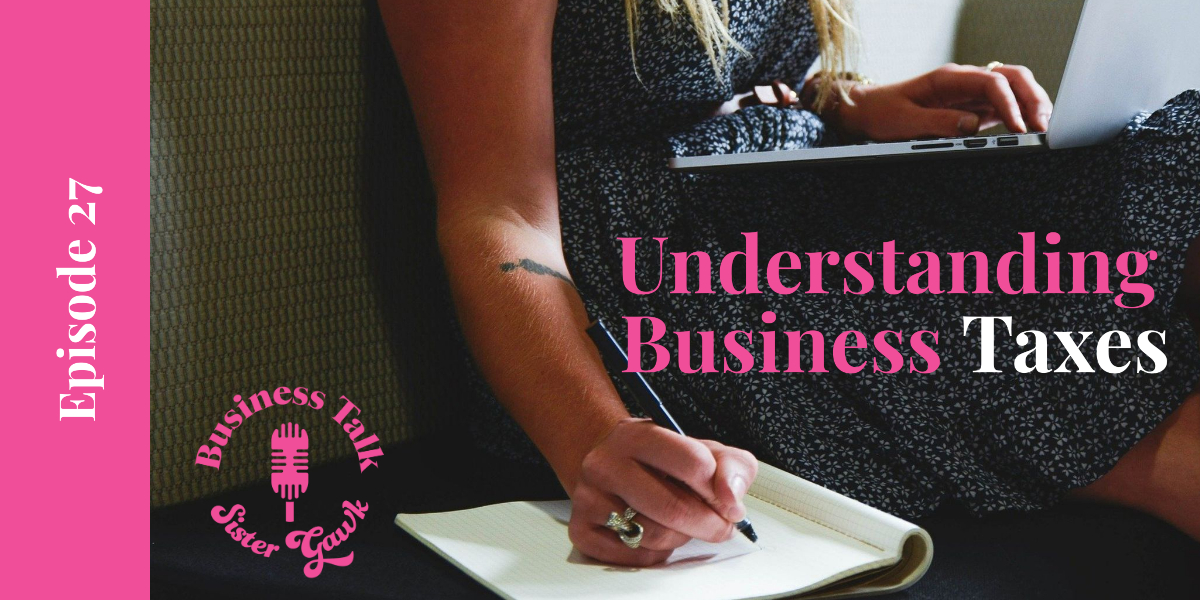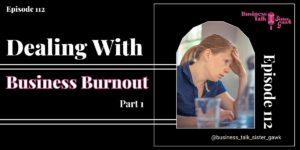This episode is part 2 of business taxes because Bekkah is just so excited to talk with you about them. We cover what it means to have a tax bracket and the difference between sales and income taxes. Don’t forget to listen till the end for another ridiculous story to gawk about. Let’s go!
Bekkah: Today we are doing part two of our series on understanding business taxes.
Ruthie: Woohoo!
Bekkah: Okay but I actually am way more excited than Ruthie about taxes.
Ruthie: I am not a huge fan of filing taxes. This year actually I was procrastinating so hardcore on writing the subtitles for an episode of the podcast that I was like, I’m just going to do my taxes.” And so I did. I call that productive procrastination.
Bekkah: I’m going to do something that I loathe a little less.
Ruthie: I like it because it’s done. I like the feeling when it’s done but I’m not a huge fan of taxes themselves.
What If I Am Scared to Do My Taxes?
Bekkah: Okay. Taxes can be scary but why are they scary for some people? Because they’re a little overwhelming, but I’m just going to say right now I once listened to a podcast from Planet Money which is by NPR and they talked about how somebody was evading their taxes and all this stuff. Actually they looked into it in a legitimate excuse in court if you file your taxes wrong because our tax system in the United States is so confusing is “I didn’t know!” That’s a legitimate excuse. After that I was like, “I have no fear of doing text anymore because if I mess up, I’m not the first person.”
There are lots of resources available so that you don’t mess up. You don’t need to be afraid of taxes because taxes can actually be an exciting time! Or filing them not, necessarily the taxes themselves, to find ways to reduce them. To me I see that as free money or money that I can save by looking for my deductions and tax credits. The first thing you should know about understanding your taxes is that you should have goals and accountability. Ruthie’s going to tell us a little bit about that so that way you don’t get behind on your taxes because it’s important to file them every year.
How To Motivate Yourself To Do Your Taxes
Ruthie: Because I know this about myself that I do not enjoy sitting for a long period of time and doing taxes, I know that I need a lot of accountability in that. I talk to people like Bekkah who will yeah just poke me every now and then. “Hey, have you done this? Have you done this?” And sometimes it’s more like a punch, “Have you done this?” But I need that! That’s with any hard thing that or something that I perceive to be very hard in my life. I know that I need a lot of accountability to be able to actually get it done and do it in a timely fashion.
For me, my goal every year is to get it done two months before the deadline which is April 15th. Because then it just saves me a lot of stress and things like that. Then I can focus on that deadline. It’s just much less stress for me to focus on that deadline as opposed to like the actual deadline. Then I just tell people about that and then say, “Hey, this is when I need to get this done. Can you follow up with me in two weeks and make sure I’ve done it or make sure I at least started it.”
What Paperwork Do I Need To Do My Taxes?
Bekkah: Who should you be talking to in order to get your taxes done? Well right now, do not talk to us because we are not certified, public accountants.
Ruthie: Just going to put that disclaimer out there that that is not our title.
Bekkah: So all of the advice we give you today take at your own risk. Please don’t sue us. Now that we’ve gotten our disclaimer out of the way, when you’re talking about doing your taxes you should think about what professionals you need to have in your life. Here’s the thing, when you pay people for their professional advice it’s because they know what they’re doing. Or they should. You should make sure to vet those people before you invest.
Ruthie: I was looking up reviews on this one taxes service and, basically, the review said, “If you’re looking for someone who is super slimy and just really into doing things under the table then this is your guy!” I just laughed hard.
Bekkah: A little unfortunate.
Ruthie: So anyway, look at reviews! They can be very forthcoming with information!
Bekkah: Another thing to know though is a quick tip that I have seen other people use too. If they still do file their taxes with an accountant, especially their business taxes or whatever. Did you know that you can start the entire process of your taxes on TurboTax for free? You just have to pay for filing. It’ll show you in the little corner like, “Here’s how much money you’re saving!” Then they’ll ask you all the questions Whether you’re going to use an accountant or maybe you just want to do it online it’s a good way to get all of your paperwork in order.
If you start the process and you don’t pay for it and just see like, “Okay. This is what I need to gather I need in order to go into my tax accountant.” Within that process too, what I have seen is some business people that I’ve talked to have caught mistakes that their accountant has made. Not all the time that happens, it’s pretty rare, but when you do it yourself and you go through sometimes it’s good just to see where all of your ducks are. To make sure you’re ready because the reality is if you’re going to hire someone to do your taxes they’re going to charge you by the hour. So if you have all of your stuff ready to go it’s going to be a lot faster and a lot less expensive.
How Often Should I Talk To My Accountant About Taxes?
Ruthie: So how often should you be checking in with your accountant about progress? How often you to talk to them?
Bekkah: It’s really going to depend on the level of volume that you’re running in your business. If you have employees all of that because there are so many other additional things that you need to file for your employees that I would definitely recommend talking with a certified public accountant at that point for sure. On the regular, if you’re offering any kind of compensation for like a 401k plan or health benefits or anything like that there are tons of different categories of things that you need to set aside and deposit into their retirement and all of those different things.
If you’re not doing them especially in withholding people’s money from their paycheck to match it and put it in a 401k, you are legally not allowed to hold that money I believe for more than 90 days. That’s something that needs to happen quarterly. When you’re talking about that kind of stuff you should really check in with your account and make sure you’re doing everything right at least quarterly for sure. If you’re working with a bookkeeper or someone who does your payroll stuff on the regular you might be okay doing it quarterly but if you aren’t you’re probably going to want to do it sooner to make sure you have everything lined up.
Ruthie: Maybe just touching base like once a month or something like that or two times quarterly?
Bekkah: Depending on the complexity of your business and how many pieces you have going and all of that. Especially if you do anything within a subcategory that requires more tax information. Say you’re going to do rental properties or you own a lot of equity in big buildings or whatever, you have to pay a property tax on those things and it’s important to make sure that you’re not missing anything when you’re going to file everything.
What Is the Difference Between a Subcontractor and an Employee?
Ruthie: You had mentioned something that I think is important to touch on. What is the difference between a subcontractor and an employee when it comes to taxes?
Bekkah: Okay, so a subcontractor is someone who works for your business and you usually have a contract with them but they’re not an employee. They have what we talked about in our last episode, a W-9. They’re filling that out saying, “Yep. I’m doing services for you.” Now there are some different stipulations for a subcontractor versus an employee. When you are a subcontractor and you’re doing all of your work for one business that can be a sticky area that you probably shouldn’t be in. Because technically they should be hiring you as an employee at that point. Unless it’s a per-project contract. There are a lot of different categories within that. I am not an expert in that area so definitely talk with your accountant about how to figure that out.
Now if you are a W-2 employee it means that you are having all of your social security and your probably your state income tax or whatever and your federal pulled out of your paycheck on every paycheck. As a subcontractor that’s not happening. You have to do that on your own. When you think about that and those differences as a business owner you’re responsible for all of the W-2 employees. Making sure that those things are being withheld and they’re going to the right places. So that when that employee files their taxes the government’s not like, “Where did all this money go?”
Should I Put Aside Money For Taxes?
One of the questions we had was, “Do you have to pay into taxes every year?” If you make any money you need to pay taxes. Yes, the answer is “yes. But within those different aspects, we need to figure out how those details are working. If you’re a W-2 employee because you’re working for a business, you file your paperwork at the beginning or annually and you readjust. Some people say, “Well, I’m going to identify as zero or one.” Meaning one person in my household. Or if you have a big family some people put four people whatever, because they have dependents so they want less of their paycheck withheld for taxes because they want to be able to use that money now. There are a bunch of different people that have different opinions on this.
Do you want the government to hold your money so that you get paid some of that back at the end? This really means you didn’t need to pay that much money to begin with but they’re holding it for you. That’s when you get a check from your tax return. Some people like that because it’s a forced savings fund. Other people don’t like that because they can be savvier and grow that money faster than the government can for them. There are different aspects on W-2s but that’s if you’re an employee. If you run a business you’re filing your taxes maybe with multiple 1099s.
Your W-9 is what you originally submit, we talked about that in the last episode, to the business you’re working for or businesses because you have more than one. Then you’re filing those 1099s that they give back to you or you’re just reporting all of the income you’ve made. Because maybe you’re only making like 20 dollars per person because you’re selling something like pottery or whatever and you’re getting that at craft shows. You’re reporting all of your income that you’ve made without a 1099 because they’re less than $600 transactions.
You’re doing that on sometimes your personal income tax if your sole proprietor passes through or if you have a more complicated business structure that you file with the government you’re paying it out of and doing your taxes for your specific business. Then on top of that, you’re reporting your personal taxes. If you’re doing a partnership that money is dependent on what’s getting paid out to you out of the business.
Should I Pay For Business Expenses Out of My Personal Bank Account?
If you have a business bank account and then you have what’s called owner draws. That can be your payment if that’s how you do it. Or some people do it just like payroll where they have a specific amount every month that they pay themselves out of their business. Now if that’s the way that functions you’re filing that as getting paid as a personal income. It really depends on your business structure which is why you need to talk to somebody about it or pay for a program like an online tax filing. You can upgrade and then get specific CPAs on call that can then talk with you about your questions. There are many different pieces to that.
Home Office Tax Deductions
Ruthie: The next thing that we’re going to talk about is home office deductions. That seems kind of like a gray area but it’s definitely something that people are facing right now especially with Covid and everything. That’s a real reality that people are looking at. What deductions and things can you take off if you have a home office?
Bekkah: Tax deductions in general we just need to recognize there’s difference between a tax credit and a tax deduction. A credit is money that you are getting for nothing. I mean well you have like a child or something and that’s a credit on your personal taxes. There are not a ton of tax credits for businesses but there are tax deductions. Meaning you spent money on this category and you can actually deduct that as part of my operating cost. A home office can be a deduction category but there are some things that you should think about before you decide to deduct that.
If you’re paying rent to yourself, you can deduct that portion and say, “Oh, well, I put money into paying rent to myself in my house.” When you do that you actually have to think about the long term of your house because you’re technically making it commercial in some ways to rent space. So when you sell your house you actually then have to pay additional taxes out of the sale of your house. Which in the long run, if you’re having your house for like 20 years, that might be worth it. Absolutely.
But if you don’t have that house for a very long time it can actually end up causing you to pay more taxes than if you didn’t pay rent to yourself out of your business. Even though in the short run every year you can deduct that from your operating expenses. That is a whole area that you can ask a bunch of people about. You know, Reddit actually is a great place to ask people about taxes. Also, they’re not certified public accountants so take that into consideration.
What Is a Business Credit?
Ruthie: What would be an example then of a business credit? Is that like if you put up solar panels and things like that then your business would get a credit from the government or what?
Bekkah: There are certain credit categories that can be. If you own a brick and mortar business and you do something with your business, maybe it was solar panels, but it’s dependent on what federal programs are running to incentivize those changes within your business. Also local government or city. There can be credits there. You should totally check out your local economic development authority because sometimes they have little grants or tax credits within that. A tax credit within Minnesota is the historical tax credit. If you spend a bunch of money on your business but you’re in a historical block of downtown or something like that whatever you spend on renovations, I think it’s about 45% tax credit.
Meaning if you spend $100 when you file your taxes you get 45% back. They’re just like, “Here you go. Here’s a credit for doing that and making sure that it’s still a historical property.” Now the catch with that tax credit is that you actually have to make sure that you have a historical architect to make sure everything is done right and your paint samples look great and blah blah blah. There are like all these little things and you will need to make sure you’re doing it right if you’re going to apply for that credit. Definitely look at what the requirements are of getting that tax credit before just going out and spending a bunch of money and assuming that the government’s going to give you some of that money back.
Ruthie: I’m just going to do whatever I want. “Look! I painted everything! And I took out that beam! Look how pretty it looks!”
Bekkah: And now there’s structural damage.
Ruthie: I think that’s a good plan. Talk to me about estimated tax payments.
Bekkah: A lot of people do what’s called estimated tax payments to make sure that they don’t have to pay in a ton of money at the end of the year. Now, if you’re not good at budgeting your money to make sure you’re setting aside that percentage that the government is going to charge you for taxes because you’re not a W-2 employee and you have to pay taxes on your own, you should do estimated tax payments. There are different ways to do that and calculate it.
I actually think that Turbotax self-employed helps show you based on your deduction so far and everything that your estimated tax payment is that you need to make quarterly. People do that to just safeguard themselves from filing their taxes at the end of the year and then being like, “Oh my word! I owe so much money and I don’t have that in my bank account!” Because they didn’t budget for it. But also at the same time, if you have a big enough business and you’re making enough money you should be paying your taxes quarterly anyway because if you’re not then you can get fined with the government at the end of the year because you weren’t making those quarterly payments.
How Do Entrepreneurs Get Paid in a Partnership?
Ruthie: Earlier you had mentioned paying yourself or if you had like a partnership and things like that. What does that look like? It seems like it kind of can get pretty sticky if you’re taking your personal money and paying for business expenses. How do you navigate that?
Bekkah: This is something that can be a really, crazy dicey situation. It sounds a little scary but it’s really not if you’re just very good at being like, “I only pay for business expenses out of my business account.” That’s super important because this is where people can get in a lot of trouble. Even if they’ve filed like a limited liability corporation whatever they have an LLC. The reason it’s called limited liability is that you’re setting up a hedge between your personal income and your business income.
Basically, if there was an issue say you’re a construction or a business that has big trucks and you accidentally backed over something or hit somebody’s car or whatever. They can sue you. If your business is all coming in as income straight to you they can not only go after the truck you own they can go after any of your personal assets. Your house or whatever else.
Ruthie: This is with the sole proprietorship they can do that?
Bekkah: Yeah. There’s less coverage. There’s more liability if you’re doing everything out of a sole proprietor than a limited liability company. Because you have that separation. Whereas, when you have an LLC if somebody sues you and they win per se, the only thing they can take is anything that has been purchased out of your business account. If you purchase the truck with your business account then they can only take the truck. They can’t go after any of your personal property. The sticky situation that people can get themselves into is when they start making personal purchases out of their business account or if they start using personal money to buy business things and they’re not documenting it well.
If you’re writing off on your taxes that, “Yeah, I have a cell phone but I use it for work and for personal use.” It’s going to ask you are you using it 40% of the time for business or personal, 60% of the time for your business or personal? You have to denote that if you’re going to say, “I purchased this phone for work and it was let’s say $500, but if I’m using it 40% of the time for personal use, I need to make sure that I’m documenting it properly that only 60% of that sole purchase is deductible. Because if I don’t do that right what can end up happening is that people can say, “Okay you’re using your personal stuff or you’re paying in with personal money.”
There’s no longer separation. You’ve lost that limited liability aspect. So they can go after your personal stuff. I’ve actually seen this happen with some people’s businesses before. If they don’t have good records that this was for a business person this was a personal purchase and they make those purchases out of the accounts that are appropriate. Oh my goodness we even had way more stuff but we just do not have the time. Ruthie’s still like, This is a lot of information.
Ruthie: Okay okay, no. But yeah you’ve got lots of good
If you enjoyed this week’s episode, check out our Tools & Tips page for more great business advice!




